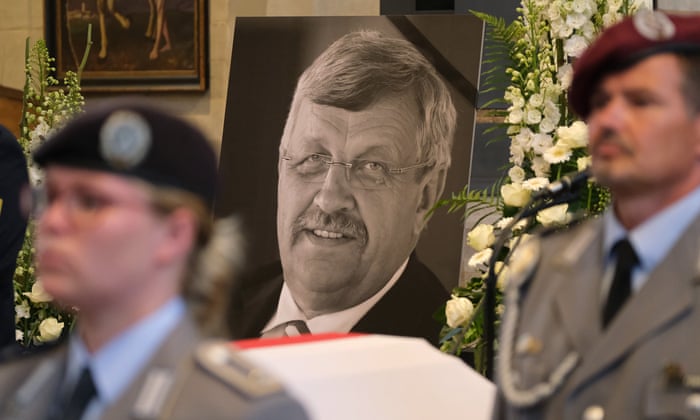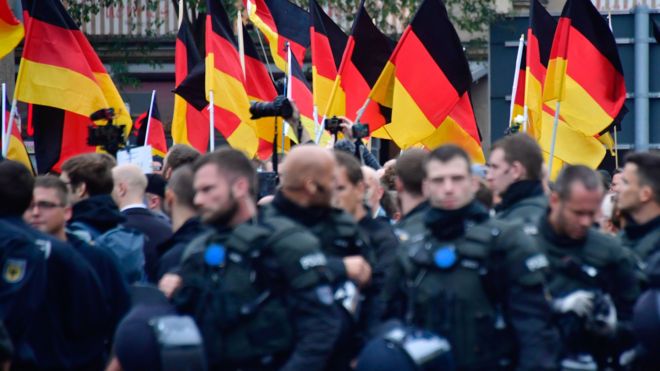Germany's Far-Right Resurgence
"I asked myself -- what is happening in our country?"
"If you look at how much hatred and harassment there is on the Internet -- a lot of it directed at local politicians, bureaucrats, sport and cultural clubs -- then I think we need to stand up and say that this is unacceptable."
Heiko Maas, German Foreign Minister
"What we are witnessing is a massive loss of respect for people in public office – not just politicians, but also civil servants, police officers, firefighters, ambulance drivers."
"There is no point in a local politician who is no longer accessible to the citizens he or she represents [through having police protection from death threats]."
"I think the very first thing we should expect from politicians after the Lübcke murder is stronger instinct to self-regulate their own speeches."
Andreas Hollstein, 57, mayor, Altena, Germany
"Why are the people of my country not flooding to the streets in disgust?"
"Now, after the death of Walter Lübcke … After death threats against Cologne mayor Henriette Reker and dozens of other politicians."
Hatice Akyün, columnist, Der Tagesspiegel newspaper
 |
| Walter Lübcke, a member of Angela Merkel’s CDU, was shot dead on the terrace of his home. Photograph: Sean Gallup/Getty Images |
With Germany's immigrant population of around five million Middle Easterners and other Muslim-heritage sources -- primarily Turkey -- already established in the country, the slowly rising tide of cultural heritage dilution struck quite a few German nationalists, leading to the rise of what is now called 'far-right' parties. Political parties mourning the loss of German values and customs, resenting the incursion of foreign elements, an exotic religion and cultural-ideological violence.
Regional politician Walter Lubcke raised a defence of Chancellor Merkel as a member of her conservative party, visiting district towns, explaining the perceived need to welcome migrants as German and Christian values. This engendered hate mail and threats and his name listed on an online neo-Nazi hit list where his address was published and videos shared along with gun emojis and the sentiment to "Shoot him now, this bastard!".
And on June 2nd, 65-year-old Lubcke was shot to death while on his porch by a suspect with a neo-Nazi past and criminal record. Not that a signal was needed that militancy of the far-right is once again resurgent in a country still struggling to own up to its World War II genocidal viciousness during the Holocaust years. It is as though the mass extermination of six million of Europe's Jews has seen atonement in Germany's acceptance of the presence of six million Muslims whose presence just incidentally has once again victimized Jews through the special brand of Islamic anti-Semitism.
"Sieg Heil and Heil Hitler! The phase of cleansing has started with Walter Lubcke. Many more will follow him. Including you. Your life will end in 2020", read the email received by Henriette Reker, mayor of Cologne who in 2015 was stabbed in the throat by a man claiming he was sending a message about the country's refugee policy. "People on the front line of defending our open society have become the target", she stated, now with guards posted outside her office.
The Federal Office for the Protection of the Constitution, Germany's domestic intelligence agency, was set up after WWII to prevent the rise of anti-democratic forces. More latterly since 2015, the agency has focused its attention on Islamist terrorism threats. The agency estimates currently that 24,100 far-right extremists are known to be present in Germany, 12,700 potentially violent, with close to 500 outstanding arrest warrants for far-right extremists.
Following the 2015 migration crisis, the Alternative for Germany party (AfD) won several seats in Parliament, and while the party has not been directly linked to political violence, analysts feel its noisy presence contributes to a normalization of violent language, risking legitimizing violence. Since 1990, German far-right extremists have committed 169 murders, according to two newspapers Die Zeit and Der Tagesspiegel's investigations.
"Destabilizing the state has always been the strategic aim of neo-Nazis, but the German authorities have never really looked at it that way.""We were told that far-right terrorism doesn't exist and accused of exaggerating", said Stephen Kramer, the chief of the domestic intelligence agency in the eastern state of Thuringia when his agency reported an escalation of the far-right threat to intelligence officials at the federal level. "Never since its creation has our republic been under as much pressure from the far-right as it is now", laments Armin Laschet, a conservative politician.
"They have tended to treat far-right violence as the result of random acts."
Tanjev Schultz, far-right extremism expert
 |
| Police escort far-right protesters in the east German town of Chemnitz Getty Images |

<< Home